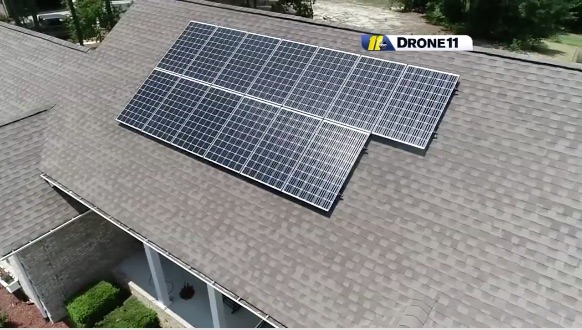ABC11 Eyewitness News on WTVD offers a cautionary tale out of Sanford to homeowners looking to get rooftop solar panels “to save on their electricity bills.” That sounds good, saving money on electricity bills, but what if you don’t realize how you’ll be shifting cost burdens elsewhere and adding new ones?
If your goal as a homeowner is to decrease your overall expenses, you’d better pay very close attention to all the details, and do the math.
Here is the news segment from their consumer protection division, Troubleshooter. “Solar panels leave Sanford couple not seeing green.”
Here are the figures reported about the Daniels family’s experience with rooftop solar, with my calculations added:
- They were told they could save $120/mo. in electricity costs.
- They would pay $90/mo. for the panels (net savings: $30/mo.).
- They “paid $17,500 to have the panels installed” (to save $30/mo.; if that were a constant rate, it would take them 583 months — or over 48 years — just to break even in nominal dollars. But solar panel payments typically last 20 years, so that would make their nominal break-even point at 27 years.
- Their electricity bills were unchanged ($133 to $276 before, $133 to $289 after)
- They received $97 in solar credit over the next year and a half from their power company (which would imply the nominal break-even point would be reached in 25 years, except they’re not saving on electricity after all)
- Their power company was an electric cooperative, not Duke Energy Carolinas or Duke Energy Progress, so their solar credit wasn’t as high as it could have been
Fortunately for the Danielses, they got the attention of ABC11 Eyewitness News’ Troubleshooter Diane Wilson. The solar panel company and the Danielses reached a private agreement whereby the solar panels were removed.
 Afterwards, the company, Power Home Solar and Roofing, issued a statement. Here’s a snippet:
Afterwards, the company, Power Home Solar and Roofing, issued a statement. Here’s a snippet:
Power Home Solar and Roofing (PHS) shares the frustration of customers who may be members of certain electrical cooperatives in North Carolina who only return a portion of solar credits to their members. In some instances, the solar energy credits offered by some, but not all, electrical co-op programs in North Carolina are 50% or less than the credits issued by larger power companies.
To help prevent customers from losing out on the solar credit savings they deserve by certain electrical co-op programs, PHS has stopped selling solar systems for homes in electrical co-ops where less than 100 percent of the appropriate solar credit is given to the co-op member. …
This is a too-close-to-home reminder of rooftop solar’s experience in Nevada. Remember how reducing the payments to rooftop solar consumers quickly made rooftop solar unworkable?
Last month Nevada introduced sharp cutbacks in its program for net metering–the fees paid to homeowners with rooftop solar installations for excess power they send back to the grid. California and Hawaii, two of the biggest solar markets, have introduced changes to their net metering schemes as well. Across the country, as many as 20 other states are considering such changes, which would dramatically alter the economics of rooftop solar.
The uncertainty has cast the solar providers’ business models into doubt. Without net metering payments, residential solar “makes no financial sense for a consumer,” SolarCity CEO Lyndon Rive recently admitted to the New York Times.
The Daniels family was fortunate to attract the attention of a local news segment devoted to consumer protection. How many others would be so lucky?
And how many would, upon getting the full rebate and enjoying the full net savings on their electricity bills as promised, have to wait nearly three decades just to break even on their initial installation costs? (Oh, wait. Solar panels have a life expectancy of “upwards of 30 years.”)


